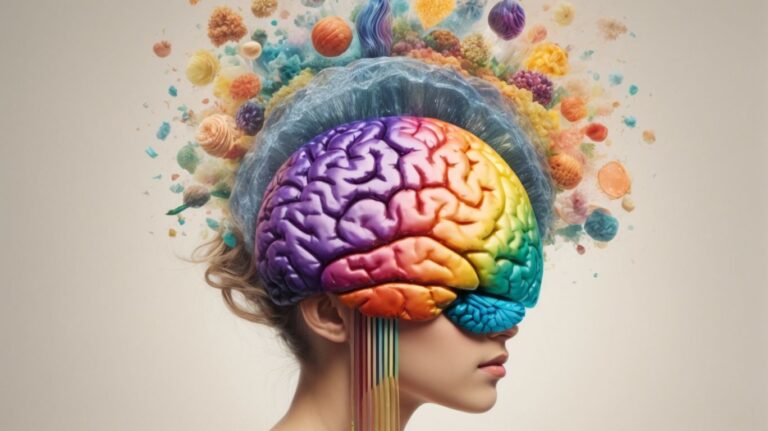If you’ve ever heard of EDD but aren’t quite sure what it entails, you’re in the right place. In this comprehensive guide, we will explore everything you need to know about Emotional Deprivation Disorder (EDD) in psychology. From defining what EDD is and discussing its symptoms to exploring its causes, diagnosis, treatment options, long-term effects, coping mechanisms, and support resources, this article aims to demystify EDD and provide valuable insights for those affected by this condition.
Contents
What is EDD?
Emotionally Dynamic Development (EDD) is a concept that integrates coaching, psychology, and human development to facilitate growth and progress in individuals.
By combining principles from coaching, psychology, and developmental coaching, EDD aims to guide individuals through various phases of life transitions, helping them navigate challenges and capitalize on opportunities. This integrated approach not only addresses current issues but also paves the way for future success by enhancing personal resilience and equipping individuals with the tools to adapt to change effectively.
EDD emphasizes self-awareness, emotional intelligence, and self-reflection, enabling individuals to better understand their behaviors, thoughts, and emotions. This heightened awareness not only bolsters personal development but also fosters stronger interpersonal relationships and improves overall performance in various aspects of life.
How is EDD Defined in Psychology?
In psychology, EDD is understood as a dynamic process that focuses on individual growth through coaching sessions tailored to each client’s unique challenges and needs.
Through the lens of psychology, EDD places significance on diving into the depths of one’s psyche to unravel the intricacies of personal development.
Personal growth is at the heart of this transformative journey, where individuals confront their inner obstacles and work towards overcoming them.
This journey is not solitary, as the presence of a skilled coach provides a guiding light, offering insights, strategies, and support along the way.
The coaching sessions act as catalysts, fostering self-awareness, resilience, and give the power toment to navigate through life’s challenges with clarity and purpose.
What are the Symptoms of EDD?
Symptoms of Emotionally Dynamic Development (EDD) manifest in various aspects of an individual’s life, including career choices, personal relationships, and social interactions.
These symptoms can often lead to feelings of confusion and uncertainty when making crucial career decisions. Individuals with EDD may find themselves struggling to find a sense of direction or purpose in their professional pursuits, as their emotions can greatly influence their choices.
In personal growth, EDD symptoms might appear as periods of intense self-reflection and doubt, impacting one’s confidence and self-esteem. Such challenges can hinder personal development and thwart efforts towards self-improvement.
EDD can significantly affect an individual’s social interactions, causing difficulties in forming and maintaining relationships. The emotional ups and downs characteristic of EDD can make it challenging to connect with others on a deeper level, leading to feelings of isolation and detachment.
What are the Physical Symptoms of EDD?
Physical symptoms of EDD may include changes in energy levels, sleep patterns, and overall well-being, often influenced by environmental factors, economic conditions, and career transitions.
For individuals experiencing EDD, noticeable changes in weight, appetite, and physical health can also manifest.
- Fluctuations in weight, such as sudden weight loss or gain, may indicate underlying stress or dissatisfaction.
- Similarly, disruptions in appetite, whether overeating or loss of appetite, may point towards emotional distress.
- Physical health issues like headaches, digestive problems, and muscle tension can be prevalent.
These indicators can intensify due to challenges in adapting to new work environments, financial pressures, or overall dissatisfaction in one’s professional life.
What are the Emotional Symptoms of EDD?
Emotional symptoms of EDD encompass feelings of stress, anxiety, and emotional instability, often requiring interventions such as stress reduction workshops, participation in coaching conferences, and the application of global best practices in coaching methodologies.
When individuals experience Emotional Domain Disorder (EDD), they may find themselves grappling with a whirlwind of overwhelming emotions that impact their day-to-day functioning. These emotional manifestations can manifest in various ways, including persistent stress, heightened feelings of anxiety, and a sense of emotional fragility. To address these challenges effectively, individuals are encouraged to engage in stress management techniques, actively participating in coaching events and workshops, and adopting proven coaching strategies rooted in global best practices. By embracing these interventions, individuals can gradually cultivate a greater sense of emotional resilience and well-being.
What Causes EDD?
EDD can be triggered by various factors, including shifts in human cognition, behavior patterns, significant life transitions, and the presence of a developmental coach who guides individuals through their developmental aspects.
Human cognition plays a crucial role in the onset of Emotional Developmental Disorder.
- Changes in thinking patterns, cognitive biases, and decision-making processes can significantly impact one’s emotional well-being and development.
- Behavioral changes, such as increased avoidance or seeking reassurance, can also contribute to the development of EDD.
Major life events like loss, trauma, or chronic stress can exacerbate EDD symptoms.
A skilled developmental coach can provide invaluable support and guidance to individuals navigating these challenges.
By offering tools for self-awareness, coping strategies, and fostering resilience, a developmental coach facilitates personal growth and emotional stability during life transitions.”
Is EDD Hereditary?
The hereditary aspect of EDD is a topic of debate in the coaching community, with discussions revolving around the inheritance of coaching abilities, the development of a coach’s skills, and their impact on personal growth amidst life’s changes.
Some argue that coaching abilities may be passed down through generations, shaping a coach’s innate talents and predispositions. Others believe that while some aspects of coaching skills may be inherited, the majority are honed through experience and training.
The ongoing nature of learning and evolving as a coach is crucial, especially in adapting to the ever-changing dynamics of life. Embracing these transformations not only enhances a coach’s effectiveness but also fosters personal growth and resilience.
Can Trauma Cause EDD?
Trauma as a potential cause of EDD has been studied extensively by experts in psychology, including researchers from the American Psychological Association, Meridian University, and influential figures like Jake, Wilber, and Jean Houston.
Studies have shown that various forms of trauma, such as childhood abuse, accidents, or combat experiences, can have a profound impact on an individual’s cognitive processes and emotional well-being, potentially leading to Executive Dysfunction Disorder. The American Psychological Association emphasizes the correlation between early traumatic events and the development of cognitive impairments later in life, shedding light on the long-term consequences of untreated trauma.
How is EDD Diagnosed?
Diagnosing EDD involves assessing emotional dynamics, cognitive patterns, and behavioral responses, often drawing on expertise from professionals like Maria, renowned psychologists like Carol Dweck, and the application of Emotional Intelligence (EI) principles within psychology and coaching.
When evaluating emotional dynamics in EDD, professionals look at how individuals express and regulate their emotions in various situations. This includes understanding patterns of emotional reactivity, resilience, and interpersonal interactions.
Assessing cognitive behaviors involves examining thought processes, belief systems, and problem-solving approaches that influence one’s perception and decision-making in relation to their emotional experiences.
The role of Emotional Intelligence (EI) in diagnosing EDD emphasizes how individuals understand and manage their emotions, communicate effectively, and navigate social complexities.
How is EDD Treated?
Treatment for EDD typically involves personalized coaching programs, tailored coaching sessions, and the implementation of coaching trajectories that leverage positive psychology principles to foster professional development and personal growth.
Customized coaching programs play a pivotal role in addressing EDD by providing targeted interventions that cater to the unique needs and challenges of individuals. These programs often incorporate a blend of cognitive behavioral techniques, mindfulness practices, and goal-setting strategies to enhance self-awareness and promote behavioral change.
Individual coaching sessions offer a confidential space for clients to explore their thoughts, emotions, and behaviors in-depth. This one-on-one approach allows for a more personalized and focused exploration of underlying issues contributing to EDD, leading to greater insights and breakthroughs.
In the design of coaching trajectories rooted in positive psychology, emphasis is placed on strengths-based approaches, resilience-building exercises, and fostering a growth mindset. By cultivating a positive and strengths-focused outlook, individuals undergoing EDD treatment can develop the necessary skills and mindset to overcome challenges and thrive in both their professional and personal lives.
What are the Different Types of Therapy for EDD?
Therapeutic interventions for EDD encompass approaches that target emotional dynamics, stress management techniques offered in workshops, and participation in international coaching conferences known for their focus on holistic development.
Individuals struggling with EDD often find solace in stress reduction workshops that provide practical strategies to enhance emotional well-being. These workshops use evidence-based tools and expert guidance to help individuals build resilience and cope with challenging situations effectively.
Engaging in international coaching conferences can broaden one’s perspectives and offer valuable insights into personal growth and professional success. Such conferences often feature renowned speakers and thought leaders who share their expertise on emotional intelligence, leadership, and self-care, making them a valuable resource for individuals looking to navigate the complexities of EDD.
Can Medication Help with EDD?
The role of medication in addressing EDD is a subject that aligns with global best practices, holistic coaching methodologies, and considerations of human development to provide comprehensive care for individuals experiencing emotional and developmental challenges.
Medication, when used effectively, can help manage the symptoms associated with EDD, offering relief in specific cases where other interventions may not suffice. It is crucial to emphasize that medication should be part of a broader treatment plan that includes therapy, lifestyle modifications, and ongoing support. In the realm of coaching methodologies, integrating medication can enhance the overall impact of therapeutic interventions, allowing individuals to cope better with their challenges and improve their quality of life.
When considering the impact on human development, appropriate medication usage can support individuals in overcoming obstacles that hinder personal growth and fulfillment. By addressing biochemical imbalances or regulating certain brain functions, medication can create a stable foundation for individuals to engage more effectively in processes of self-discovery, self-improvement, and emotional regulation.
What are the Long-term Effects of EDD?
Long-term implications of EDD may include sustained growth trajectories from coaching interventions that cater to unique needs, social adjustments, and adaptations to economic and environmental changes over time.
Consider the profound impact of coaching trajectories that guide individuals toward skill development and personal growth, fostering a sense of purpose in navigating diverse challenges. These coaching interventions not only equip individuals with tools for success but also encourage social integration by fostering connections and relationships within communities.
As economic and environmental landscapes evolve, those who have received tailored coaching support are better equipped to respond to these dynamic changes, adapting their strategies and approaches to thrive in the face of uncertainty.
How Can Someone Cope with EDD?
Coping with EDD involves embracing changes positively, integrating principles of positive psychology to enhance professional skills, and engaging in stress reduction workshops to manage emotional dynamics effectively.
Embracing change positively in the context of EDD is a vital aspect of fostering resilience and growth. By adopting a mindset that values adaptability and openness, individuals can navigate the challenges of EDD with greater ease. Leveraging positive psychology principles further enhances this process by focusing on strengths, optimism, and solution-oriented thinking.
Participation in stress reduction workshops not only cultivates mindfulness and relaxation techniques but also provides a supportive environment for individuals to connect, share experiences, and build coping strategies collaboratively.
Are There Support Groups for EDD?
Support groups tailored for EDD are prevalent in the coaching community, often featuring discussions on global best practices, innovative coaching methodologies, and insights shared at international coaching conferences.
These support groups serve as invaluable platforms for EDD practitioners to stay updated with the latest trends and strategies in the field. By aligning themselves with global best practices, members can elevate their coaching skills and better serve their clients. The utilization of advanced coaching methodologies within these groups fosters a culture of continuous learning and improvement.
The knowledge exchange facilitated at international coaching conferences further enriches the experience of support group members. Networking with peers from around the world provides a diverse perspective and fresh ideas to enhance their coaching techniques.
What Self-Care Techniques Can Help with EDD?
Self-care practices for EDD encompass participation in stress reduction workshops, engagement in developmental self-care strategies, and the application of cognitive-behavioral techniques to manage emotional dynamics and promote holistic well-being.
Participation in stress reduction workshops can provide valuable tools and techniques for individuals to cope with the pressures of everyday life. Through these workshops, attendees can learn relaxation methods such as deep breathing exercises and mindfulness practices, which are essential for lowering stress levels and enhancing overall well-being.
Engaging in developmental self-care strategies plays a crucial role in fostering personal growth and self-awareness. This may involve practices like journaling, setting boundaries, and prioritizing self-compassion to nurture emotional resilience and promote inner balance.
Utilizing cognitive-behavioral techniques for emotional management is another effective way to address negative thought patterns and enhance emotional regulation. By challenging and reframing irrational beliefs, individuals can develop healthier coping mechanisms and improve their overall mental health.
Frequently Asked Questions
What is EDD in Psychology?
EDD in Psychology stands for ‘Explanation, Description, and Diagnosis’. It is a method used by psychologists to understand and explain psychological phenomena through observation and analysis.
How is EDD different from other psychological methods?
EDD differs from other methods like experimentation and surveys as it focuses on exploring the individual experiences and behaviors of a person in a specific context, rather than generalizing results.
Why is EDD important in Psychology?
EDD is important in Psychology as it allows psychologists to gain a deeper understanding of human behavior and mental processes. It also helps in developing effective interventions and treatments for psychological disorders.
What are the steps involved in EDD?
The steps involved in EDD include:
1. Explaining the phenomenon or behavior being studied
2. Describing the factors that contribute to the behavior
3. Diagnosing the underlying psychological processes or disorders that may be causing the behavior
4. Developing a comprehensive understanding of the individual’s experiences and behaviors.
How is EDD used in clinical settings?
In clinical settings, EDD is often used to assess and diagnose psychological disorders, as well as to develop individualized treatment plans for patients. It helps psychologists to understand the underlying factors contributing to a person’s symptoms and how to address them effectively.
Can EDD be used in other fields besides Psychology?
While EDD is primarily used in Psychology, it can also be applied in other fields that involve understanding human behavior and mental processes, such as sociology, education, and anthropology. It can also be useful in business settings, such as understanding consumer behavior and decision-making processes.



